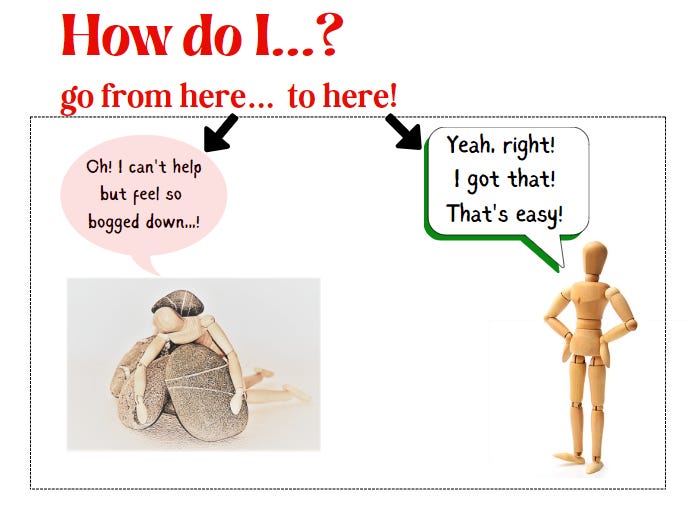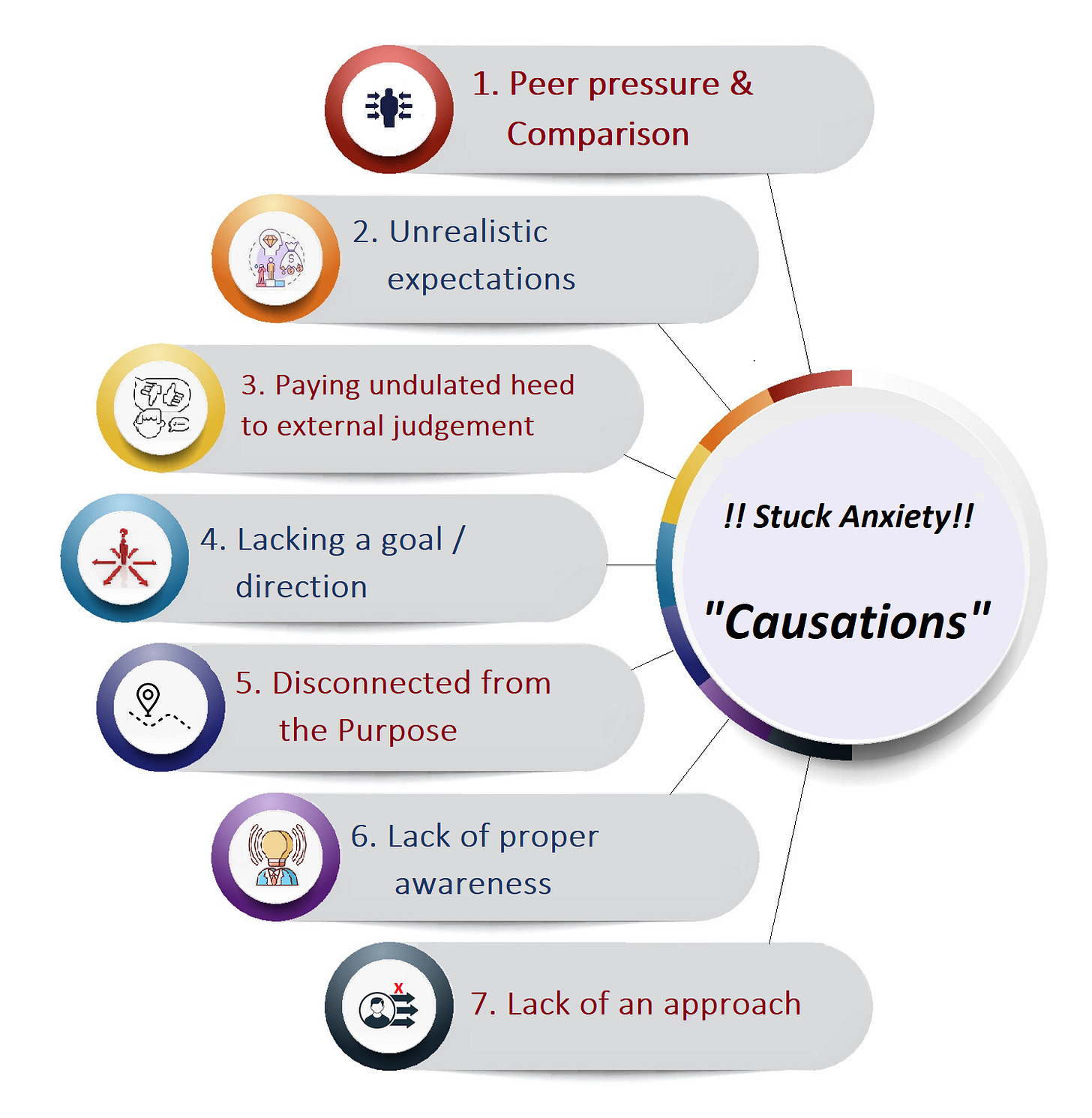Stuck Anxiety
Tasks, workflows, jobs, careers are places where “stuck anxiety” could kick in & find conditions to thrive on. Here’s how you could realize it, trump that feeling & take control.
“Timelines / deadlines are usually the thorn largely impeding the quality of end results over the progression of a smooth process that is: CREATIVITY”
Ever felt stuck…?
Feeling stuck is a term that is believed to be typically associated with creative work like say designers who seem to run into these patches of anxiety over “decision fatigue”, “creative blocks” believed to be induced usually by strict deadlines or even writers who identify with the all common “writer’s block”. But the reality is that it could be applicable to many other professions across levels and hierarchies.
Let’s get into exploring some real-world examples here:
a software architect could be stuck with choosing the right tech stack or designing the best set of tools so as to facilitate robustness of the impending software being built – the worry induced largely by whether or not it would all be scalable
software engineers could feel anxious and stuck over that optimal piece of code to write given how they have a big launch going into the week over the current silo – the worry induced largely by failure to get it right leading to tons of tech debt
leaders could be anxious over which route to take so as to conquer those goals quicker & with a minimal effort & time
cofounders could be really anxious over how the bets they have taken or are supposed to take might fall short of their business goals
It could be very common even for the best in the business to feel stuck at times over some outcome that they ought to achieve. What may start out as a one-time affair may soon lead to a chain / sequence of similar events turning into a syndrome / condition that could grip one with fear / anxiety that one would be forced to deal with nervous energy.
Let’s delve deeper into this symptom & its causation(s).
Here’s a definition (borrowed from anxietycentre.com):
“This anxiety symptom is often referred to as unwanted and repetitive thoughts. Some refer to it as obsessions or obsessional thinking. You may become distraught and worry that your mind is “stuck” in a never-ending loop. Others fear that the loop could get worse and may never end”
Having had to deal with much of this personally & more so looking at new recruit PMs I had managed & more recently while talking to many junior / senior product managers, aspirants I see how common this symptom is, and its prevalent across geographies too.
Causation(s)
There could be a variety of reasons and situations that could directly result in the symptom or otherwise give rise to situations that could intern lead to it.
Here are some common reasons:
Let’s explore each of them.
1. Peer pressure & Comparison
It could be very normal for us humans to compare, and to compare is only human. It is quite evident that even if a person isn’t inclined to comparing they’d start doing it at that instant onwards when they’re subject to peer pressure.
For example:
If someone makes about US $240,000 a year and it’s not like that salary came to him sans any efforts, but all of that trouble could get washed away, mentally draining the person when they bump into someone who is perhaps of the same age or even younger who is earning US $ 360,000 a year.
When there are no bounds to human expectation, learning how to keep it in check would work wonders. But, if there still is an endless expectation it ought to be channelized properly so as to employ it to one’s favor.
Lesson: Yes! By all means, compare! Not to feel sorry for yourselves but to rather work harder and get up that ladder.
2. Unrealistic expectations
More often than not the expectations that some people carry over that new job role could be so unrealistic and surreal, by the time they understand it or come to terms with reality, things would have turned really sour and they’d find themselves in what could seem like a point of no return, a blackhole. The next thing you know, they wait to quit and are looking for that first exit.
For example:
Working in engineering building software products at an organization it could be easy for someone to perceive that their life would turn 360° when they join this (x) organization and everything that they yearn for or manifest would then be theirs for the taking, but then when actually get there it could end up feeling like their whole life is a big lie - “the grass is green on the other side”.
It’s natural for anyone to get excited about something owing to some element of fascination which could really be unexplainable. But the value you could add in that situation to yourself over taking a step back, calming yourself down, thinking about the entire situation rationally, meeting ground reality by talking to people who have been there and done that cannot be discounted at all.
Lesson: Indeed! Dream big, but at first - ensure it is right for you and you’re sorted over the optimal path to take to get there.
3. Paying undulated heed to external judgement
Talk to 10 random people and pop a specific question over a topic and you may get about 30 different responses, each of them stemming from their personal experiences which could carry real semblance or could be randomized opinions that could potentially appear polarized over “yes” & “no” in the worst case.
For example:
Say someone quit his 7-figure salaried job to pursue a dream of building his startup and over a social gathering when people inquire about the change, it is very probable that it may not go down well with the people around & they could be startled leading them to talk ill about / underplay the rationale entirely. But, it is amazing how it could all be totally comprehensible & how quickly the very same people could comply with a similar situation when their own kith / kin happens to make that very move. “Damn & blast!”
To pay heed to external judgement could never be a wise option at all. NEVER. Yes, many people may be vocal about your choices but the one thing that ought to be underlined here is how the very same people could have such an opposite view on the same topic when it’s centered around them. It’s a total waste of time to pay heed to people with double standards, just pass it off with a wide grin or even better is to hold a “poker face”.
Lesson: Leave opinions at what they are – “opinions”, take them with a grain of salt and move on, unless they come from someone who is qualified to talk on a subject & knows what he’s saying.
4. Lacking a goal / direction
Most people aren’t clear on their end goals and that naturally leads to a lot of confusion over what they have got to do right now and what ought to be done next & what they ought to consider important and what’s worthy of letting go which is to say they tend to operate devoid any roadmap in a way.
For example:
Today I see how the times have changed and so have the students who are stepping out of colleges / universities, but there was this whole belief about 20 years back which was centered around “you’ve just got to go where the money is” which looks like it’s more of a logic that stemmed from someone who was in the shambles because that clearly indicates a total lack of direction and non-confirmation to any sort of a goal.
Remember those narrations over how starting early is upheld as the de-facto standard for anyone who is looking for a financial product like say term insurance? Come to think of it, it does apply to a whole lot of things apart from finance like say, career planning which is definitely at the helm.
Lesson: Always insist on going in with a well devised plan with enough heed given to the cases & the options, however minor or major the outcome may be as it could give you enough time to think it through and scope all angles that could affect the outcome so as to help you plan better.
5. Disconnected from the Purpose
At times when people do have their eyes perched on a certain goal which could be more of an offshoot of an ambition, confusion could still prevail over what to pick which then leads them into nodding “yes” and taking up everything that’s tossed at them sans any window of time allotted towards analyzing as to whether the initiatives happen to be aligned to the purpose, and if yes how well it is connected.
For example: a person who is working for an IT giant whose line of business is aligned towards IT services fueled by his ambition of reaching the top management takes up an MBA in marketing (correspondence / online / vocational) and looks to use that qualification to market himself as a best fit for management jobs.
When it may look surreal and a page straight out of a dream for some, it is really possible that these steps are neatly charted out so as to be well connected with the purpose at first and then put in that right quantum of effort in the right direction to get on the path towards those goals. It’s not always about the quantum / magnitude of steps taken but the fact they are relevant & result in tangible & totally aligned progress is what ought to take more precedence.
Lesson: It’s not enough to have a goal, what’s more important is to be able to understand whether the purpose of individual tasks / outputs is connected to the outcome.
6. Lack of proper awareness
It is probable that a career move is a first-time affair, meaning there could be no prior experience and that transition could be totally new. And over such cases the most common problem is how each and every situation could look totally alien and how the burning need could be felt for confirmations over all major or minor steps which boils down to the problem of awareness.
For example: say someone with experience in project management who has had 10+ years of experience in managing teams, people & deadlines over deliveries is coming to terms with how his career has hit a level of stagnation and is now all fascinated by product management and wants to make that transition but is befuddled with all the options in the market, he could easily end up paying a huge price in terms of time & cost while still being left behind in the race totally.
Lack of awareness is a killer, it proves to be detrimental to lethal in most cases. Drawing a parallel, supposing you are driving your car in a new city what would you do to find directions to a place that you want to get to? It’s simple, isn’t it?
Refer Google Maps (or)
Just ask someone who is a local
It’s the same concept applied here. When you don’t know / seem lost for direction do consult someone who you think could be of help whilst ensuring that the person & his experience is largely aligned to your goals and the current position you find yourself in.
Lesson: Pursue something because you are madly in love with it, you have undying passion for it. Nothing else in the world could come close to being a good enough reason. And when your passion takes control you’d always ensure that you have proper awareness built and you’d quite naturally be focused on learning over every step.
7. Lack of an approach
Sometimes it is very plausible to feel stuck over “THE approach” to take so as to hit that goal faster. When it could be very natural for anyone to pick “minimal effort & time associating it with a maximum yield”, the situation could be totally against it and the best that could be possible may be “maximum time and minimal to moderate gain” which again leads to apprehension.
For example: it is very natural for someone who is a data scientist with some experience to think that they could take things under control straight away when they step into a new organization or a role on the back of writing and optimizing some great ML algorithms to achieve innovative outcomes, but things could take a bitter turn when he comes to terms with how teams are totally unclear and seem to be staring at raw data and are still far away from the data lake stage & how the management also seems to be clueless about it all.
Quite frankly each situation could be easily stripped down to gain an understanding over finding the answers to these questions:
Where do I stand right now? (assessment)
Do I pick (x), (y) or (z) outcomes so as to get to my goals? (alternatives)
When all those outcomes are looking great from my vantage point, which of those is optimal given my goal? (analysis / optimal path)
What do I change from here so that I get to the top right quadrant of the risk and reward plot over this Eisenhower matrix (refer fig. below)?
Lesson: The approach as it is said and believed is more than half the game, decide on the approach by experimenting, learning & iterating if need be, which is essentially in-line with LEAN but never jump into finalizing anything without proper analysis.
Remember:
Passion for a craft trumps everything else when it comes to factors contributing to success because that would then convert to proper research, realistic goal setting, pinning on the right approach, setting milestones, ensuring whether or not you’re heading in the right path over every silo, being open to experimentation & factoring those learnings which are all necessary pillars of success.
And most importantly, you’d be able to focus better as you’d then begin to identify & drown out the noise completely.







